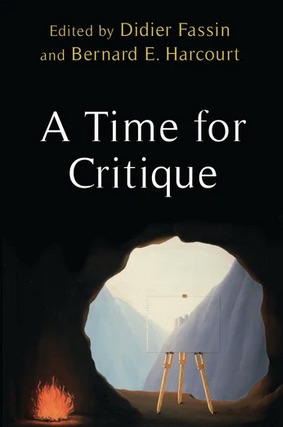In a world of political upheaval, rising inequality, catastrophic climate change, and widespread doubt of even the most authoritative sources of information, is there a place for critique? This book calls for a systematic reappraisal of critical thinking—its assumptions, its practices, its genealogy, its predicament—following the principle that critique can only start with self-critique.
In A Time for Critique, Didier Fassin, Bernard E. Harcourt, and a group of eminent political theorists, anthropologists, sociologists, philosophers, and literary and legal scholars reflect on the multiplying contexts and forms of critical discourse and on the social actors and social movements engaged in them. How can one maintain sufficient distance from the eventful present without doing it an injustice? How can one address contemporary issues without repudiating the intellectual legacies of the past? How can one avoid the disconnection between theory and action? How can critique be both public and collective? These provocative questions are addressed by revisiting the works of Foucault and Arendt, Said and Césaire, Benjamin and Du Bois, but they are also given substance through on-the-ground case studies that treat subaltern criticism in Palestine, emancipatory mobilizations in Syria, the antitorture campaigns of Sri Lankan activists, and the abolitionism of the African American critical resistance and undercommons movements in the United States. Examining lucidly the present challenges of critique, A Time for Critique shows how its theoretical reassessment and its emerging forms can illuminate the imaginative modalities to rejuvenate critical praxis.
- Table of Contents
- Acknowledgments
- Introduction, by Didier Fassin and Bernard E. Harcourt
- Part I: Critique as Practice
- 1. How Is Critique?, by Didier Fassin
- 2. Critique as a Political Practice of Freedom, by Linda M. G. Zerilli
- 3. Critique Without a Politics of Hope?, by Ayşe Parla
- 4. The Usefulness of Uncertain Critique, by Peter Redfield
- 5. Human Rights Consciousness and Critique, by Karen Engle
- 6. Critique as Subduction, by Massimiliano Tomba
- 7. What’s Left of the Real?, by Vanja Hamzić
- Part II: Critique in Practice
- 8. Subaltern Critique and the History of Palestine, by Lori Allen
- 9. Critical Theory in a Minor Key to Take Stock of the Syrian Revolution, by Fadi A. Bardawil
- 10. Pragmatic Critique of Torture in Sri Lanka, by Nick Cheesman
- 11. Dispossession, Reimagined from the 1690s, by David Kazanjian
- 12. Crisis, Critique, and Abolition, by Andrew Dilts
- 13. Law, Critique, and the Undercommons, by Allegra M. McLeod
- 14. Critical Praxis for the Twenty- First Century, by Bernard E. Harcourt
- List of Contributors
- Index

